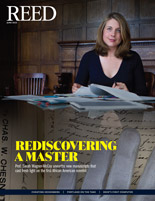
IRIS login | Reed College home Volume 94, No. 2: June 2015
Out of the Shadows
Thank you, Paula Scott ’85 and Chris Lydgate ’90, for taking the trouble to write and to publish the letter “Out of the Shadows” in the March 2015 issue of Reed. I have been grousing about Reed mullahs and hope the following comments add something useful to considerations of gender and justice.
The closely defined personal roles of my 1966 cohort and the contemporary culture of rape make it difficult to hold the college accountable for faculty expectations of female students. I did have a keen sense of being a designated breeder. A faculty member stressed the importance of raising children at a time when I was sustaining an abusive relationship with a fellow undergraduate and not even close to recovering from earlier and all too common misuse. I did not know how to protect my body, my time, or my energies. Acquiring an engagement ring was as important as collecting a diploma. I will not list the dorm mates who sobbed about their unadorned third left fingers on graduation day. Female students paid the same fees as males. Whether they received equal value is worth questioning.
The long march since commencement has been punctuated by its share of outrages, a few of which I was lucky to survive. The details aren’t important, but the culture binding is. It might as well be binding feet, not to mention gagging the mouth. I prefer a fair contest. Title IX and Prof. Lloyd Reynolds’ [English & art 1929–69] 1973 advice to look to sports for enlightenment and ignore “these gurus who are coming over here by the boatload” pointed me, finally, to the nearest Y. Twenty years of training alongside accomplished athletes and street-smart Ave rats opened my eyes to my own fouls as well as to the many cheap shots I did not know how to identify when I was younger.
I find it most interesting to evaluate considerations of social justice by considering education and personhood rather than gender or race. It may be helpful to remember that, as I understand it, late-19th-century clergy were debating the very existence of women’s souls. The current campaign for an animal bill of rights is promising: the first successful child abuse prosecution was brought in New York City under animal cruelty law. Next summer’s alumni college discussion of diversity promises to be as fruitful as last summer’s look at religion.
![]()
I was at Reed during the mid to late ’50s, and was romantically (sexually) involved with two professors. At the time I did not know that these relationships were as common as later they were characterized to have been. I knew of no other examples than my own. I thought of them as I thought of my relationships with other students. I was not traumatized, nor did I feel exploited. I never felt that the relationships were in any way connected with my academic achievements, but that they were in an entirely separate realm.
I see these ’80s women as attempting to rewrite history, from a time before many of them were born. I consider myself a feminist and I am fully in agreement with many of the more activist feminists’ positions. But I stop short of imputing motives to people that they didn’t have. I, myself, am a rape victim, if that matters. I was raped by a stranger who climbed into my bedroom window in the middle of the night, woke me up, robbed me of $13, and proceeded to beat and rape me for about two hours, until he heard a police siren (not an uncommon sound in a city) and left. This was true rape, and left me in bad shape physically for over a week and psychologically for the rest of my life. But many actions called “harassment” and therefore “as bad as” rape are not.

LATEST COMMENTS
steve-jobs-1976 I knew Steve Jobs when he was on the second floor of Quincy. (Fall...
Utnapishtim - 2 weeks ago
Prof. Mason Drukman [political science 1964–70] This is gold, pure gold. God bless, Prof. Drukman.
puredog - 1 month ago
virginia-davis-1965 Such a good friend & compatriot in the day of Satyricon...
czarchasm - 4 months ago
John Peara Baba 1990 John died of a broken heart from losing his mom and then his...
kodachrome - 7 months ago
Carol Sawyer 1962 Who wrote this obit? I'm writing something about Carol Sawyer...
MsLaurie Pepper - 8 months ago
William W. Wissman MAT 1969 ...and THREE sisters. Sabra, the oldest, Mary, the middle, and...
riclf - 10 months ago